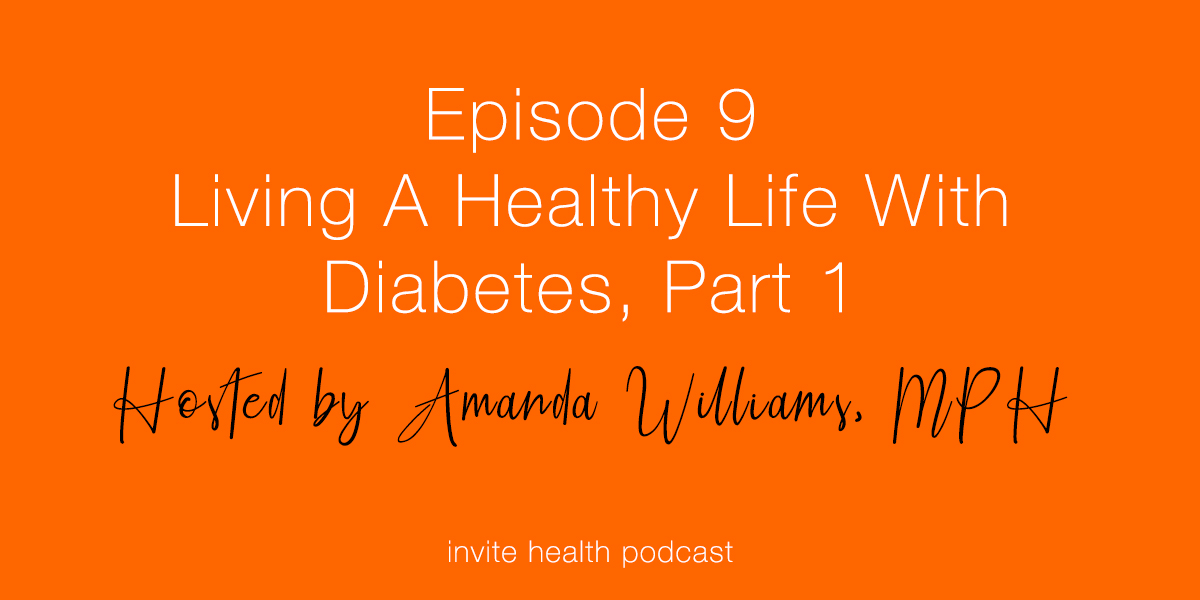The Tools You Need to Lead A Healthy Life with Diabetes, Part 1 – Invite Health Podcast, Episode 9

Invite Health Podcast, Episode hosted by Amanda Williams, MPH
Subscribe Today!
This is the Invite Health Podcast, and I am your host, Amanda Williams! On today’s episode, I am going to be delving into diabetes. This is such a complex disease and there is so much misinformation out there. I really want to be able to break this down for you into completely understandable terms, as well as provide you with a foundational understanding as to what you can be doing with your diet, as well as nutrients that can be very beneficial. I will be breaking this down into multiple episodes to better help you understand all of the components of diabetes.
I take a lot of pride in this area of nutrition; I have a specialized certification in diabetes self management, and a Master’s degree in public health. I actually worked in the disease state management program at a local hospital, working directly with diabetics. Let’s get started!
What is Diabetes?
When you breakdown diabetes, you have type 1 diabetics and type 2 diabetics. Now, type 1 diabetes is oftentimes called juvenile diabetes because the onset is, generally speaking, at a much younger age due to a lack of insulin that the pancreas could not produce. This is more autoimmune driven, as opposed to type 2 diabetics where, overtime, the insulin response (or insulin sensitivity) becomes less and less. This is also known as developing insulin resistance.
Now, because of the misinformation and mismanagement of diabetes, many times type 2 diabetes will present itself as type 1, getting to the point where the pancreas is no longer producing insulin, becoming insulin dependent. The majority of diabetics in the US are of the type 2 nature.
Pre-diabetics are marching down the pathway of becoming a type 2 diabetic. This represents approximately 85 – 90 million Americans. This is truly a public health epidemic. There are many long term complications when individuals with diabetes do not take action, which includes lifestyle and dietary modifications.
Many times, there seems to be a reactive approach to diabetes, with individuals waiting until their numbers are so bad that they require medication, as opposed to being proactive. I always recommend a proactive approach with type 2 diabetes, because I have seen the impact of taking control of your own health.
Take A Deeper Look Into Your Body
Many times, when you think of an individual with diabetes, you may think that they are eating nothing but sugar and unhealthy foods (which can definitely be the case). But what about looking into the way your body is working on an everyday basis? What actually is happening when you eat?
This is truly a public health epidemic.
– Amanda Williams, MPH
Go back into your childhood and picture a teeter-tooter – one person sits on a side, another person sits on the opposite side and goes up and down. When you eat, there is a release of glucose – the glucose is going up and our insulin is down low. What should happen, is the pancreas responds with insulin to help lower the glucose levels. When you have insulin resistance, you have a very delayed response in the release of insulin from your beta cells. This causes access glucose to circulate the body for a long period of time. This is why it is so important to pay attention to what you are eating – in order to address which foods are ideal, which foods spike glucose too fast, which are slower, and more.
When you are in a fasting state, like overnight, oftentimes your liver overproduces glucose, which is why you may have a really elevated blood glucose level if you test first thing in the morning.
Managing Diabetes
Every body is different so there are some lifestyle changes that others will react well to, whereas some do not. But there are some general rules you can follow in terms of the right nutrients – like Magnesium and Vitamin D. These are the basic necessities for individuals with diabetes.
You must understand that there is an essential role for important nutrients and vitamins in our body. When our diets are lacking these essential vitamins and minerals, you start to see long term implications. In part 2 of The Tools You Need to Lead a Healthy Lifestyle with Diabetes, I will take you into the world of essential vitamins and nutrients when managing Diabetes.
Thank you for tuning in to the Invite Health Podcast. You can find all of our episodes for free wherever you listen to podcasts or by visiting www.invitehealth.com/podcast. Make sure you subscribe and leave us a review! Follow us on Facebook, Twitter and Instagram at Invite Health today. We’ll see you next time on another episode of the Invite Health Podcast!
Key topics:
- Defining Diabetes
- The patheology behind Diabetes
